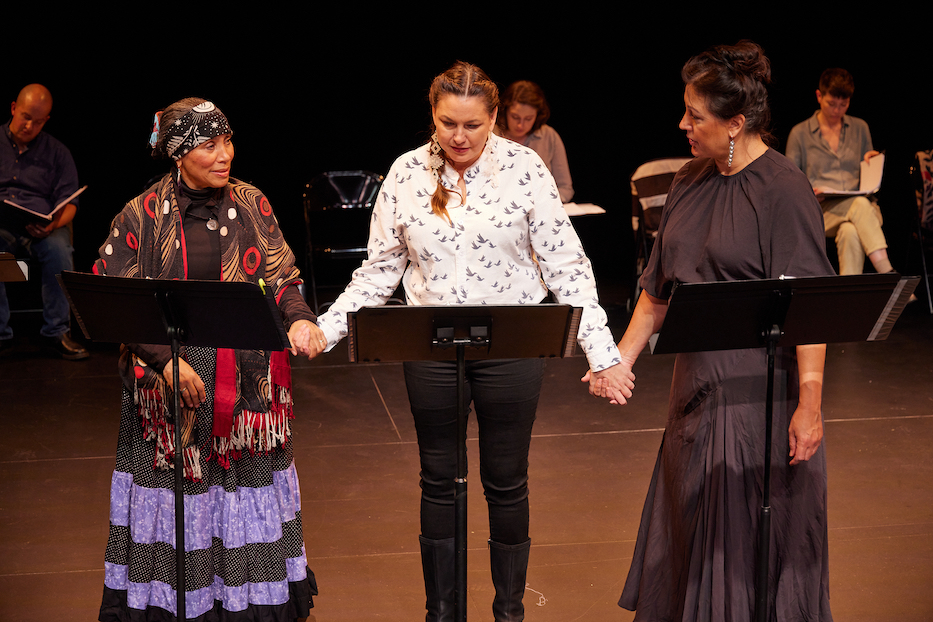
Long Wharf Theatre | Arts & Culture | Theater | Arts & Anti-racism
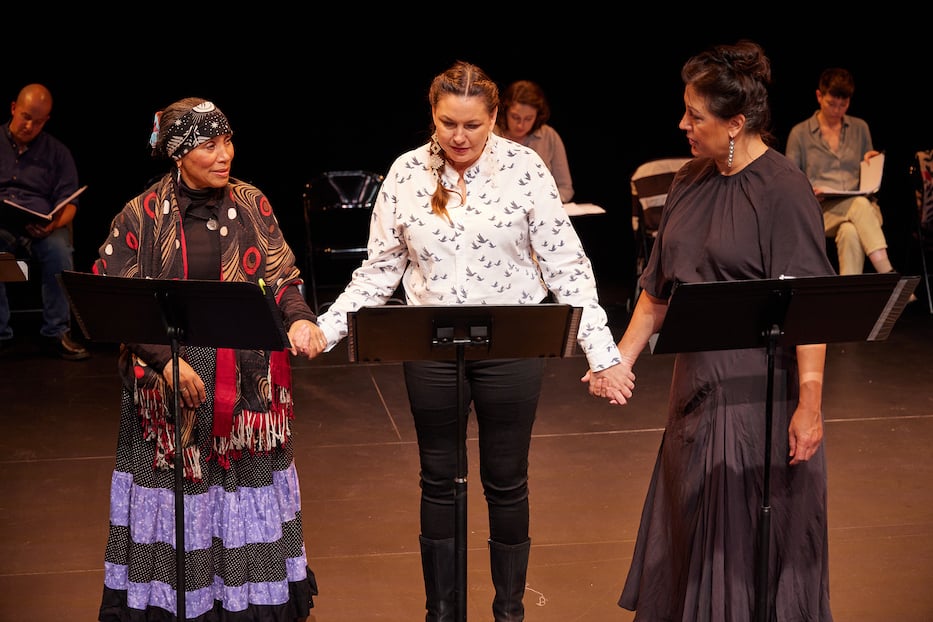
Joan Henry, DeLanna Studi, and Allison Hudson Hicks in a reading of Flying Bird's Diary at Long Wharf Theatre. Jeremy Daniel Photos.
Lights come up at center stage. Fidelia Fielding stands beside her grandmother, Martha Uncas, and the space between them holds centuries of history. To their right, a half-circle of music stands transforms into a large rock edifice. Fidelia climbs, her ear pressed to the rock. She slips, gathers herself, and tries again. At the sky-facing summit, she can hear its heart beating.
“Up here, I feel like a great flying bird all on my own,” she says.
That history, which is also Connecticut history, graced Long Wharf’s stage last weekend, as Flying Bird’s Diary closed the theater’s 56-year run at 222 Sargent Dr. Written by Melissa Tantaquidgeon Zobel and directed by Madeline Sayet, the work tells the story of Fidelia Hoscott Fielding “Flying Bird,” a keeper of Mohegan culture and language whose story has, until recently, gone largely untold. As it came to the theater for a two-day reading last week, it marked an end to one physical space, and the beginning of another. The theater now moves officially into itinerancy.
Based on Zobel’s screenplay on the same subject, the script traces Fielding’s life, traditional Mohegan belief in the Makiawisug or Little People, and mentorship of Gladys Tantaquidgeon, a Mohegan medicine woman who was Zobel’s mentor before her passing in 2005. It is the first time in the theater’s five and a half decades that a Native cast, creative team, playwright and director have shared the space, creating in it the possibility of another, more just future.
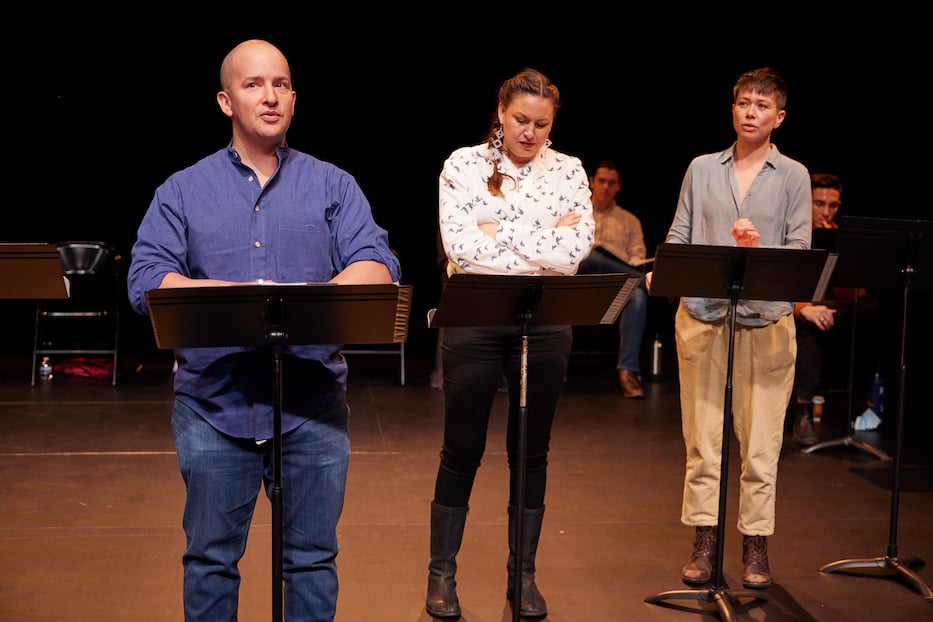
Opalanietet, DeLanna Studi, and Jessica Ranville in a reading of Flying Bird's Diary at Long Wharf Theatre. Jeremy Daniel Photos.
“Fidelia was so incredibly unfamous and so incredibly unknown,” said Zobel, a medicine woman and Mohegan tribal historian whose writing on Native people and histories reaches back decades. “She was hanging on to something that many people didn’t want [to] and probably felt shame about. I had this really deep feeling and this understanding in my heart that this was a story that needed to be saved.”
“This is a really important moment for us, to be able to tell this story in this way,” Sayet added at a rehearsal Friday afternoon, applauding Long Wharf for creating space for the work. “It feels like we are being treated as if our story actually matters, which historically was just never the case.”
Zobel’s voice is one of many, over multiple generations, that have carried the work into being. Born in 1827, Fielding grew up at a time when Mohegan culture—particularly speaking the language—was directly at odds with a white, settler-colonialist mentality that urged assimilation while still subjugating Native people. Beaten at school for speaking the language, Fielding began to write it down, maintaining a direct tie to the words and culture that were fading around her.
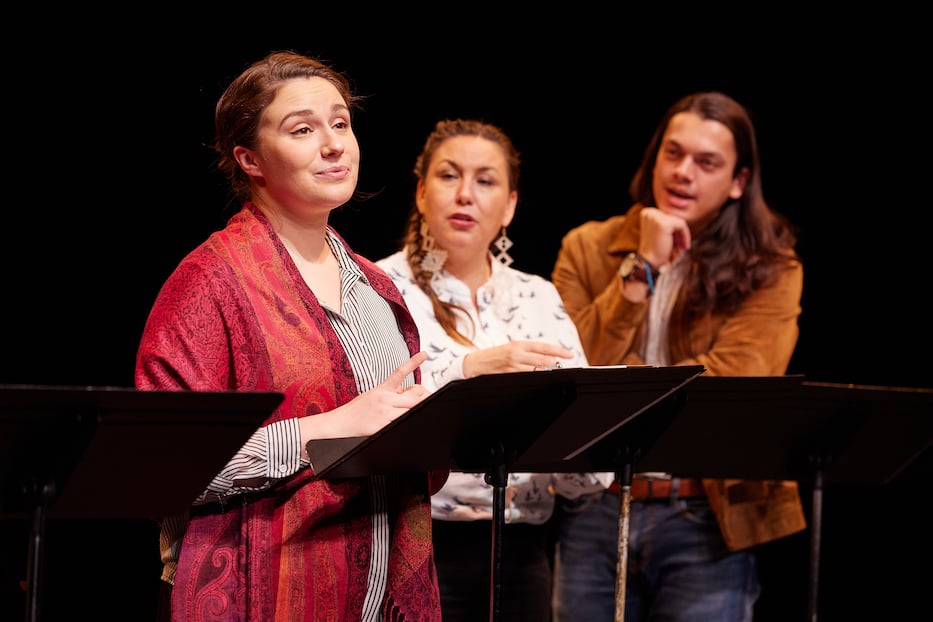
Madeline Easley, DeLanna Studi and Trevor Hosteen McChristian in a reading of Flying Bird's Diary at Long Wharf Theatre. Jeremy Daniel Photos.
For years, “she learned kind of on her own,” Zobel said. At the turn of the twentieth century, she found a willing pupil in Gladys, who kept her stories and teachings alive for over 100 years. She also met Frank Speck, then a graduate student in anthropology at Columbia University. After convincing her to let him borrow her diaries, Speck wrote extensively about Fielding and the Mohegan language—often failing to convey the very belief system Fielding sought to keep alive.
In the play, Zobel is particularly good at drawing this line, showing how Speck (played by Opalanietet) lives in one world, and Fielding in another.
“The language is lost?” he asks her at one point, during their first meeting.
“I have not misplaced it,” she responds with a sharp edge in her voice.
After Fielding’s death in 1908, several of the diaries burned in a fire at Columbia. Others, discovered in Speck’s University of Pennsylvania office after his death in 1950, were distributed to fellow universities instead of returned to their rightful home with the Mohegan Tribe in Uncasville. Only recently did Cornell University return three of the diaries and papers to the Mohegan Tribe, in a ceremony in late 2020. “We believe that these papers coming home is really Fidelia coming home to us,” Chief Lynn Malerba said at the time.
What spoke to Zobel was not just the stories she had heard passed down from Gladys Tantaquidgeon, but the nuance and beauty of the language itself, which she described last week as inherently “oppositional to English.” Speck may have been trying his best to translate the language, she said, but he failed to understand the basic beliefs and concepts embedded within it.
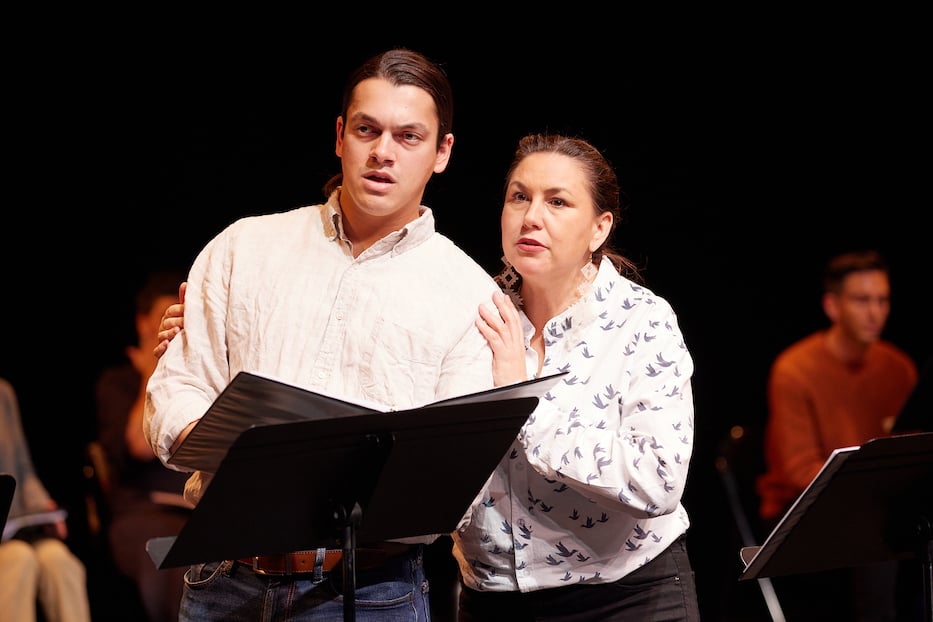
Trevor Hosteen McChristian and DeLanna Studi in a reading of Flying Bird's Diary at Long Wharf Theatre. Jeremy Daniel Photos.
In the Algonquin language family, for instance, gender is absent, and creatures great and small are recognized as animate. “If a fly buzzes in your hair, you would say, ‘Somebody’s in my hair,’” Zobel said. People may meet their physical end, but the ancestors remain alive—“they're always animate and around you,” she said. The woods, the rocks, the animals, the land—they too are all alive.
“If the land is alive, you can’t really sell it,” she said in a conversation Friday. “Native people can’t own land. Native people can argue over territory, but it wasn’t bounded in the same way. The topic of individual property ownership didn’t exist.”
“So what is the value of Fidelia today?” she later added. “Stop for a minute. Look at the world and see how it could be different. She deserves to be celebrated for her fortitude.”
At Long Wharf, where a reminder of land theft and enslavement precedes every performance, that history sprang to life Friday afternoon, during hours of rehearsal and a final run-through before performances on Saturday and Sunday. As DeLanna Studi, Madeline Easley, and Trevor Hosteen McChristian took the stage, they wound back the clock to the mid-nineteenth century, when Flying Bird was still a teenager, holding fast to a language that was so much a part of who she was.
Time moved in vignettes: Fidelia (Studi) singing sweetly beside her friends Emma Baker (Madeline Easley) and future husband William Fielding (McChristian) en route to school, carrying a lunch basket woven from sweetgrass; Fidelia nursing a wound on her backside after the school teacher (Jessica Ranville) has beaten her with a paddle; Fidelia learning respect for the Makiawisug through her elders (a nod to Bruce Two Dogs Bozsum as Henry) even as that world faded around her.
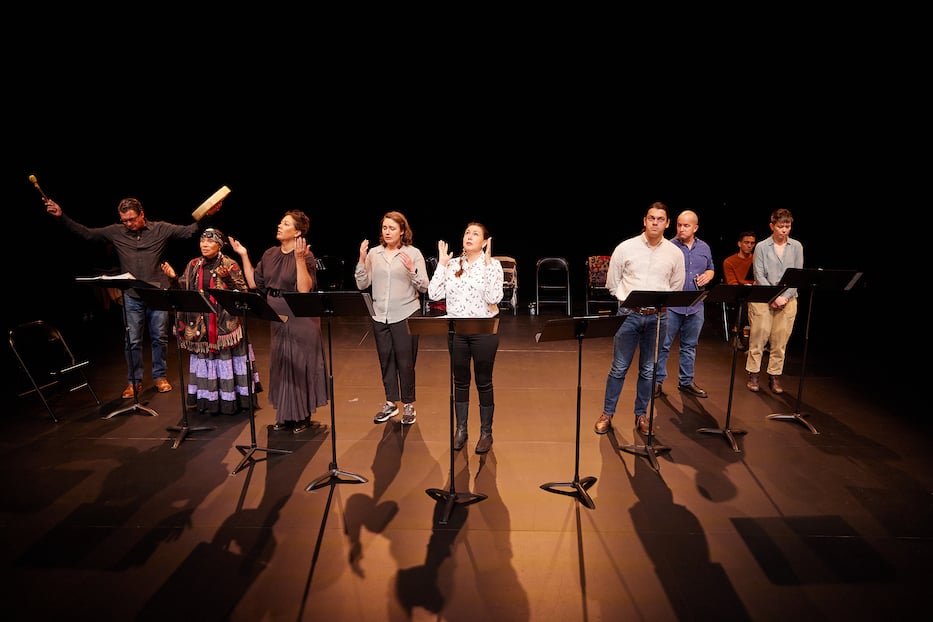
From left to right: Bruce Two Dogs Bozsum, Joan Henry, Allison Hudson Hicks, Madeline Easley, DeLanna Studi, Trevor Hosteen McChristian, Opalanietet, Jessica Ranville, and Bradley Lewis in a reading of Flying Bird's Diary at Long Wharf Theatre. Jeremy Daniel Photos.
And later, Fidelia growing old, cautiously meeting Frank Speck, and ensuring her legacy in Gladys (Jolie Cloutier), who went on to study anthropology herself and became one of the founders of the Tantaquidgeon Museum in 1931. Friday, Studi and Cloutier carried the work beautifully, weaving a story that bridged two pandemics and flowed through the present.
The script, which lives beyond the two-day run, is a gift and a teaching opportunity. As a writer, Zobel ties in centuries of history, from colonial notions of manifest destiny to a takedown of James Fenimore Cooper that is both humor-flecked and long overdue. It feels right, then, when Gladys challenges the very study of anthropology with one sentence, or when Emma pulls out a cake, and notes the importance of celebration even “when times are hard.”
The work, which uses Mohegan language and humor as both a narrative device and a balm, returns to Fielding the respect she did not always receive during her lifetime. At the end of her life and even in death, Fielding was made fun of and often dismissed as dementia-riddled and unwell, including by Speck, said Zobel. In the play, a 12-year-old Gladys recalls the hundreds of people who packed into her funeral, if only to confirm that she was dead (“She’s not, you know,” Gladys says with that knowing look in her eyes, and the play lurches forward).
Like Anna Deavere Smith’s Fires In The Mirror, which played at Long Wharf earlier this year, there’s a kind of bearing witness here. To watch the work is to learn from Fidelia, and also to imagine a world where she was not laughed out of a room or discounted for trying to keep a culture alive. It’s a world where land and people, and people and people, are in healthier, mended relationship with each other. As the audience gets a glimpse of it, Zobel leaves them with the unspoken question: how will you understand the world differently now? How will you be kinder to everything and everyone that is in it?
Friday, Zobel noted the sense of coming full circle. When she was preparing to bring the performance to Long Wharf, she learned that the theater opened its doors in 1965 with Arthur Miller’s The Crucible. Both plays push and probe “New England mythology” and history, she said. Both center their stories on powerful matriarchs. Both are meant to live on long after the lights have come down, and the stage doors have closed for the last time.
“I feel like this moment is being framed as like a ‘last’ moment in the space,” Sayet added during a break in rehearsal Friday. “And actually, I think this is the first instance in which a major Connecticut theater has centered a Connecticut Indigenous story. And so in some ways, I’m thinking of it more as a beginning. As Long Wharf is coming out of this space and out of these walls, how is this a beginning of what their work might look like in the future?”
Learn more about Melissa Tantaquidgeon Zobel's work here. Learn more about Long Wharf's 2022-2023 season here.

